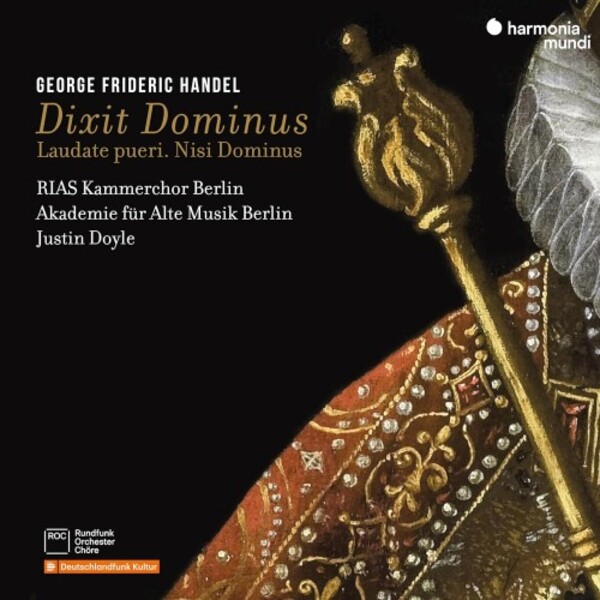HANDEL Dixit Dominus. Laudate Pueri. Nisi Dominus
View record and artist detailsRecord and Artist Details
Genre:
Vocal
Label: Harmonia Mundi
Magazine Review Date: 04/2024
Media Format: CD or Download
Media Runtime: 60
Mastering:
DDD
Catalogue Number: HMM90 2723

Tracks:
| Composition | Artist Credit |
|---|---|
| Dixit Dominus |
George Frideric Handel, Composer
Akademie für Alte Musik Berlin Alex Potter, Countertenor Andreas Wolf, Bass Berlin RIAS Chamber Choir Carolyn Sampson, Soprano Hugo Hymas, Tenor Johanna Winkel, Soprano Justin Doyle, Conductor Viktoria Wilson, Soprano |
| Laudate pueri Dominum |
George Frideric Handel, Composer
Akademie für Alte Musik Berlin Alex Potter, Countertenor Andreas Wolf, Bass Berlin RIAS Chamber Choir Carolyn Sampson, Soprano Hugo Hymas, Tenor Johanna Winkel, Soprano Justin Doyle, Conductor Viktoria Wilson, Soprano |
| Nisi Dominus |
George Frideric Handel, Composer
Akademie für Alte Musik Berlin Alex Potter, Countertenor Andreas Wolf, Bass Berlin RIAS Chamber Choir Carolyn Sampson, Soprano Hugo Hymas, Tenor Johanna Winkel, Soprano Justin Doyle, Conductor Viktoria Wilson, Soprano |
Author: Richard Lawrence
It was through the agency of one of his patrons in Rome, Cardinal Colonna, that Handel was commissioned to compose psalm settings for Vespers at the Carmelite church, S Maria di Monte Santo, in 1707. The church celebrated the Feast of Our Lady of Mount Carmel every year on July 16; Laudate pueri and Nisi Dominus were completed on July 8 and 13 respectively.
Nisi Dominus is scored for chorus and three soloists, each of whom is given a solo spot. The appropriate plainsong psalm tone appears, loud and clear, in the opening verse and in the ‘Gloria’. Of the brief solo sections the most vivid is ‘Sicut sagittae’, where rushing scales in the violins illustrate ‘the arrows in the hand of the giant’. In Laudate pueri, for solo soprano and chorus, Handel adds a pair of oboes to the strings. Orchestra, soprano and chorus praise the Lord in turn, with playful exchanges in different registers. ‘Sit nomen Domini’ is more reflective. Justin Doyle is slower than Marc Minkowski, with an eloquent postlude from the oboist Xenia Löffler. Carolyn Sampson is superb throughout, dancing along in ‘Excelsus super omnes’ and matching the violins’ skittishness in ‘Qui habitare facit’, where the soprano’s opening phrase looks forward to ‘O had I Jubal’s lyre’ in Joshua.
Dixit Dominus, composed three months earlier, may also have been performed at the Vespers celebrations. The vigorous opening movement for the chorus, splendidly done, is followed by the continuo-only ‘Virgam virtutis’, smoothly sung by Alex Potter and with a prominent bass line from the cellist Jan Freiheit. Johanna Winkel brings an attractive wistfulness to the unpromising text of the next verse, ‘Tecum principium’, which Handel sets as a minuet.
The RIAS Kammerchor punch out phrases like ‘et non poenitebit’ and ‘conquissabit capita’ with admirable force. In contrast, where Minkowski on the rival recording articulates ‘Tu es sacerdos’ with precise, detached phrases, Doyle is no less effective with his gentler approach. Only in one verse is Minkowski clearly superior: Doyle’s chorus sopranos are no match for the near erotic charge that Annick Massis and Magdalena KoŽená find in the sinuous phrases and semitone clashes of ‘De torrente’. A minor reservation about an excellent recording.
Explore the world’s largest classical music catalogue on Apple Music Classical.
Included with an Apple Music subscription. Download now.

Gramophone Digital Club
- Digital Edition
- Digital Archive
- Reviews Database
- Full website access
From £8.75 / month
Subscribe
Gramophone Full Club
- Print Edition
- Digital Edition
- Digital Archive
- Reviews Database
- Full website access
From £11.00 / month
Subscribe
If you are a library, university or other organisation that would be interested in an institutional subscription to Gramophone please click here for further information.




